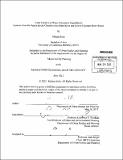Value creation in water allocation negotiations : lessons from the Apalachicola-Chattahoochee-Flint River and Lower Colorado River Basins
Author(s)
Solis, Miriam
DownloadFull printable version (7.865Mb)
Other Contributors
Massachusetts Institute of Technology. Dept. of Urban Studies and Planning.
Advisor
Lawrence E. Susskind.
Terms of use
Metadata
Show full item recordAbstract
Intense water disputes in the United States are being caused by new and conflicting demands from many quarters and changes in water availability that appear to be caused by climate change. Projections of heightened water conflict signify the need to understand the best methods of resolving these disputes. The published literature on negotiation suggests that parties are more likely to develop sustainable agreements and cooperative relationships through an integrative approach to negotiation. In these instances, negotiators work to understand each other's interests to jointly create and distribute value. This thesis examines the role of value creation in water allocation negotiations to determine if and how it enables agreement. Water allocation negotiations in the Lower Colorado River and Apalachicola-Flint- River Basins are compared; an agreement was reached in the first case but not the second. My findings support the hypothesis that value creation enables agreement; they also suggest that even when value is created, its allocation may prevent agreement among parties. Findings are used to deduce a broader set of lessons associated with value creation and the benefits of an integrative approach to negotiating water allocations.
Description
Thesis (M.C.P.)--Massachusetts Institute of Technology, Dept. of Urban Studies and Planning, 2012. Cataloged from PDF version of thesis. Includes bibliographical references (p. 62-72).
Date issued
2012Department
Massachusetts Institute of Technology. Department of Urban Studies and PlanningPublisher
Massachusetts Institute of Technology
Keywords
Urban Studies and Planning.